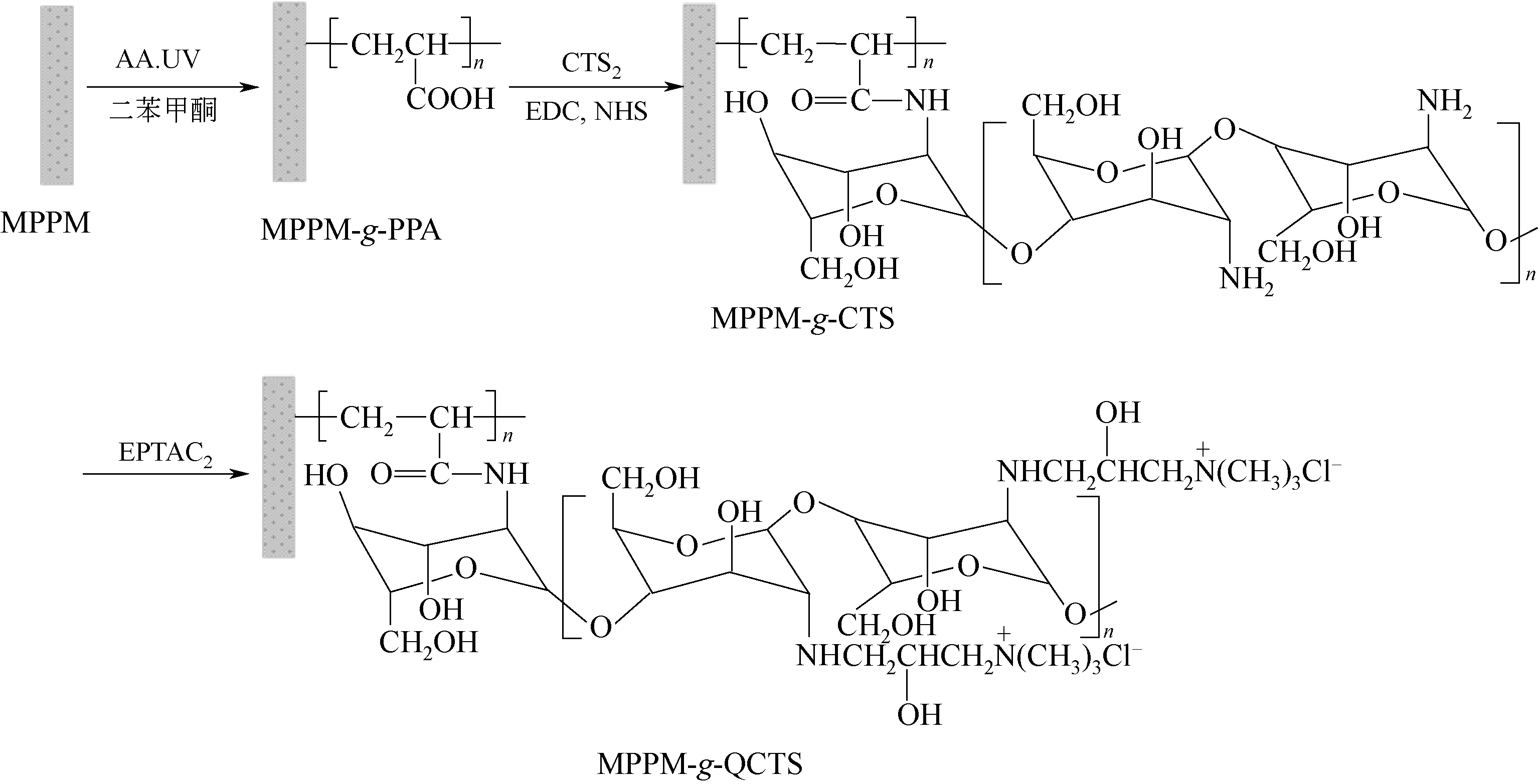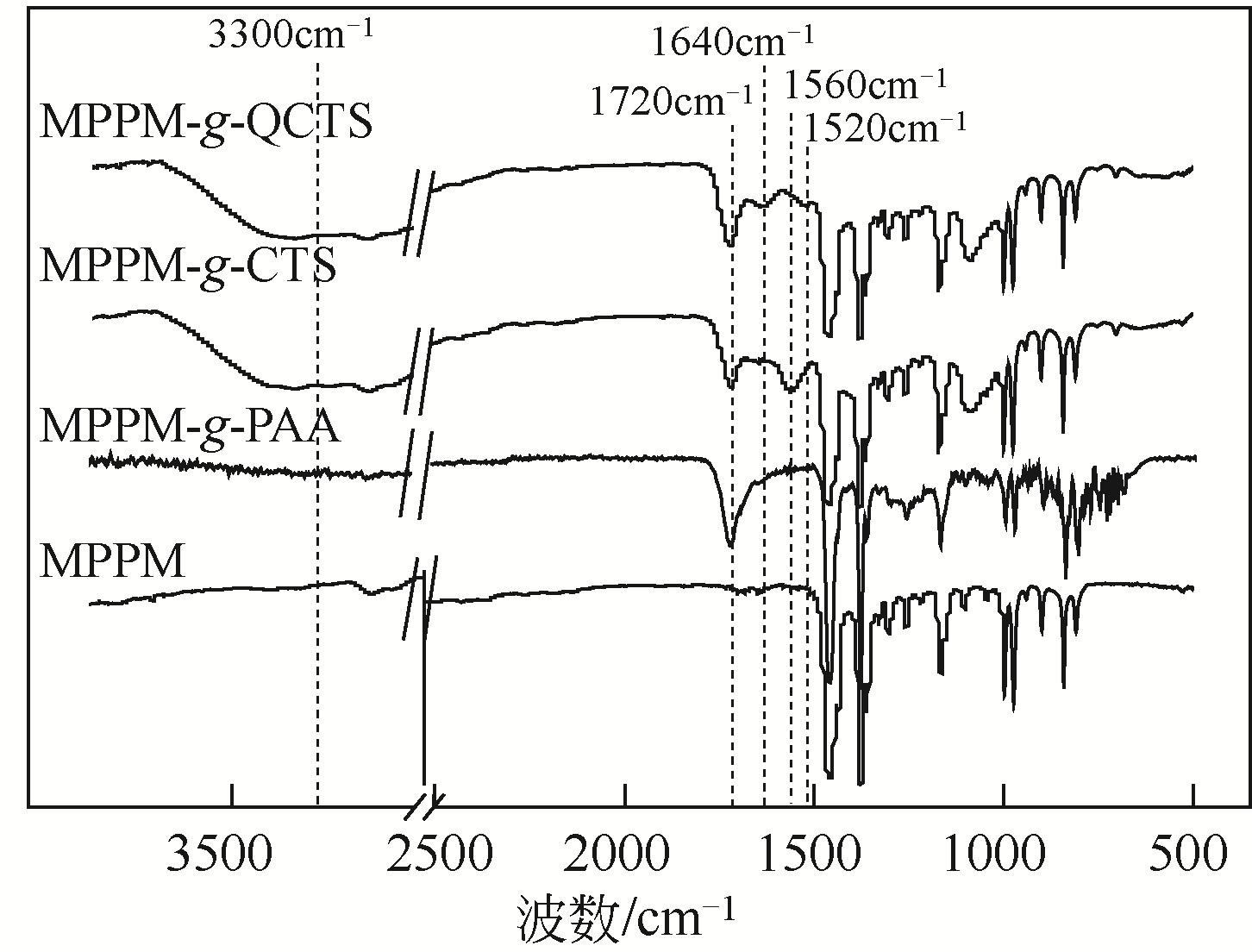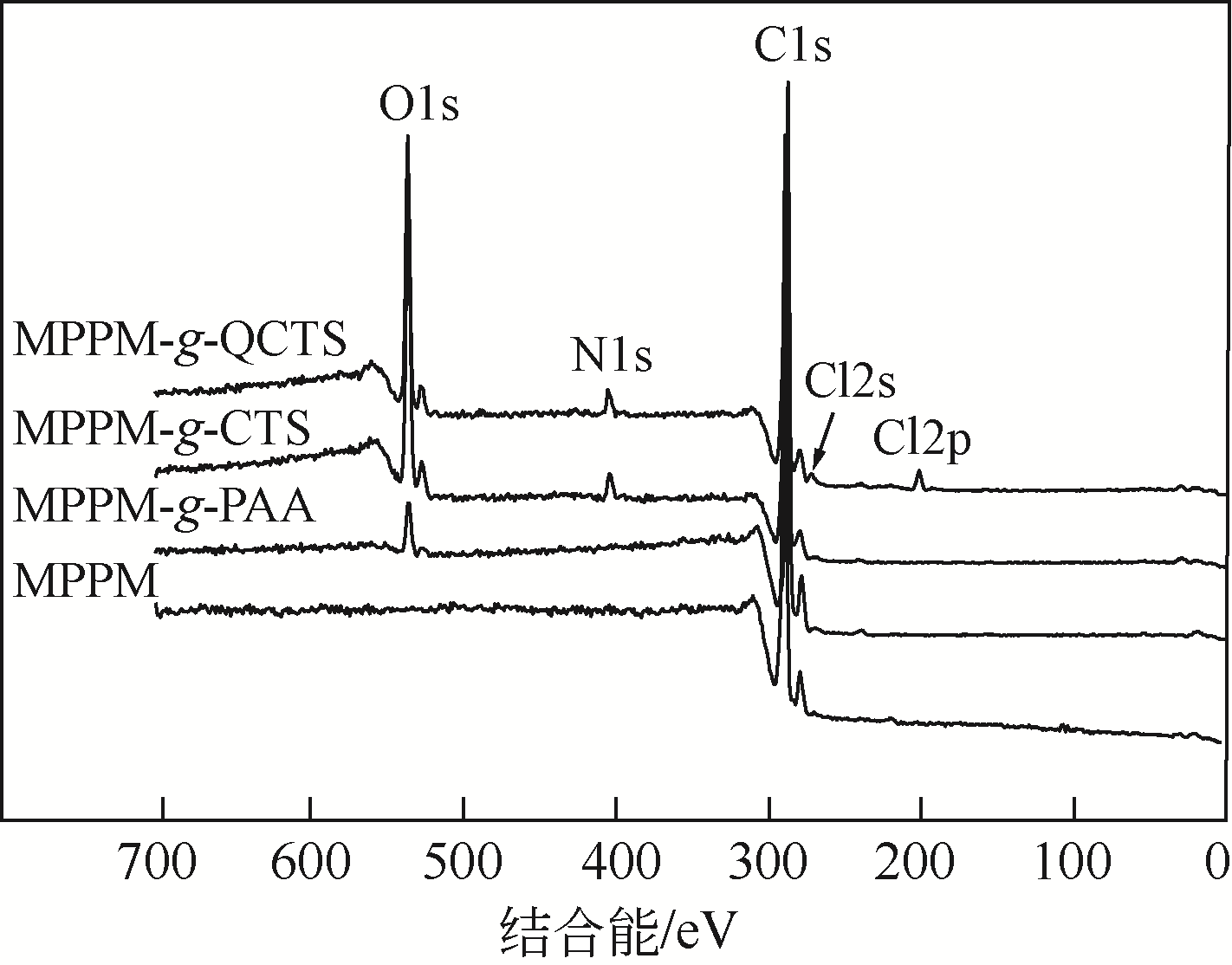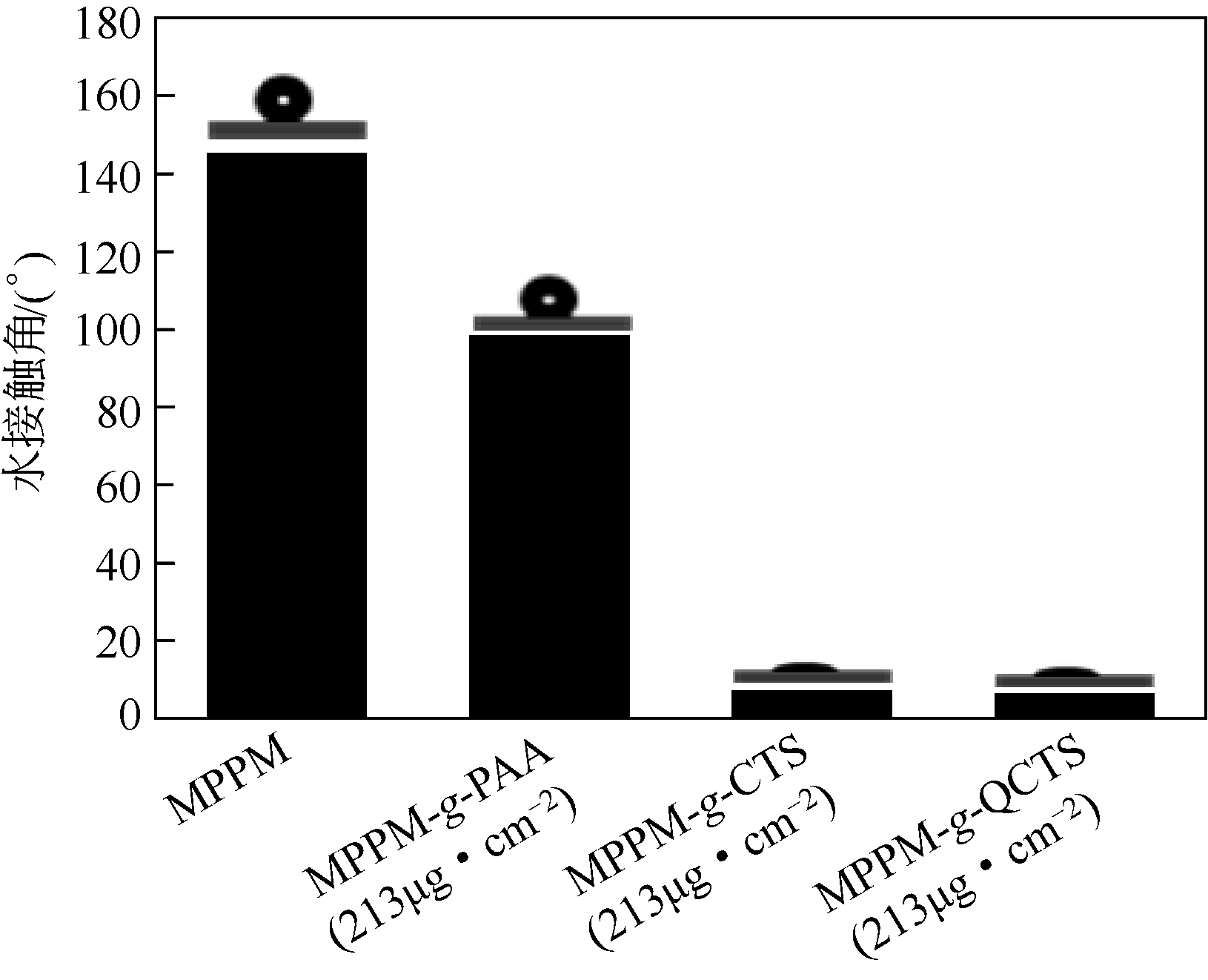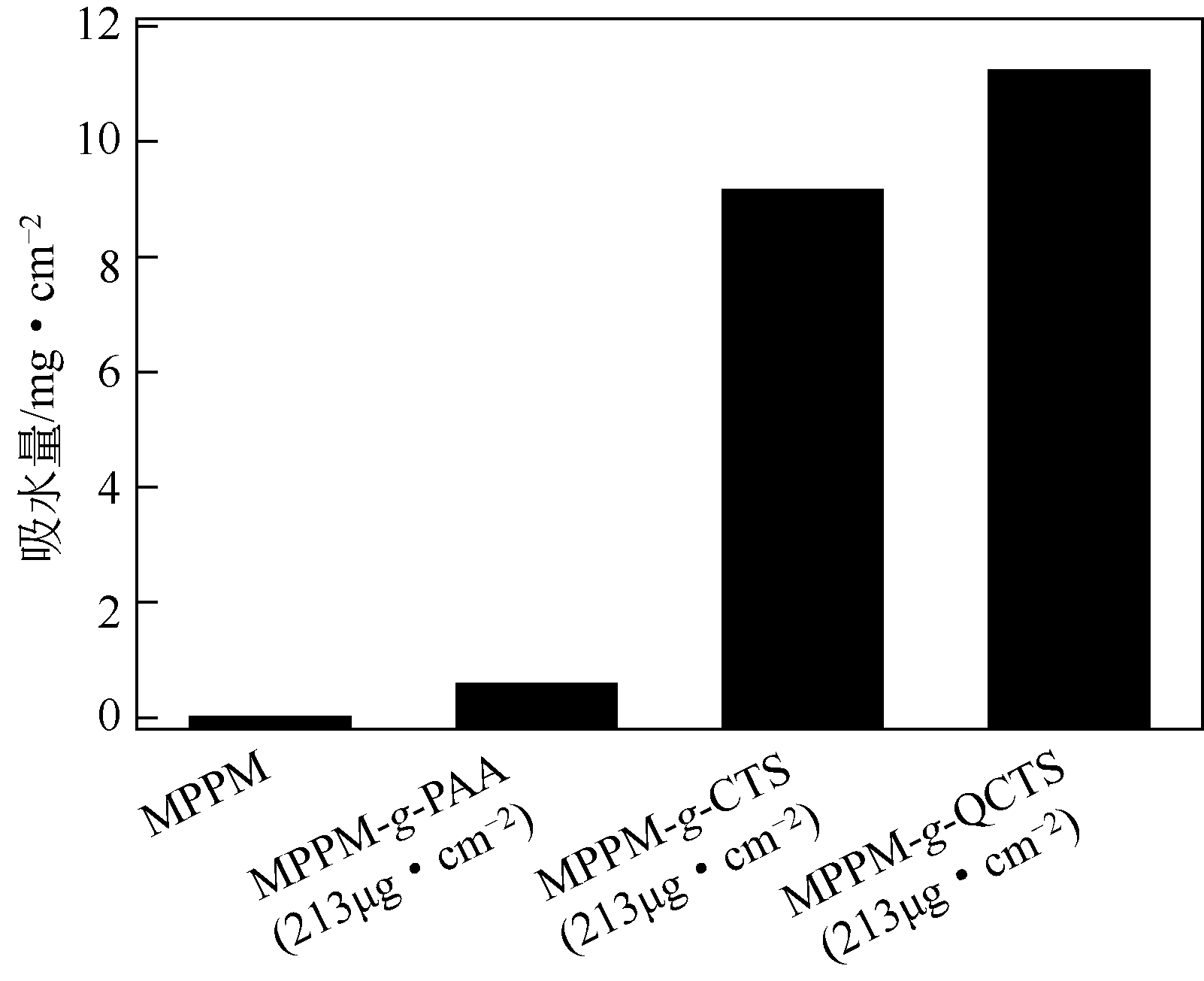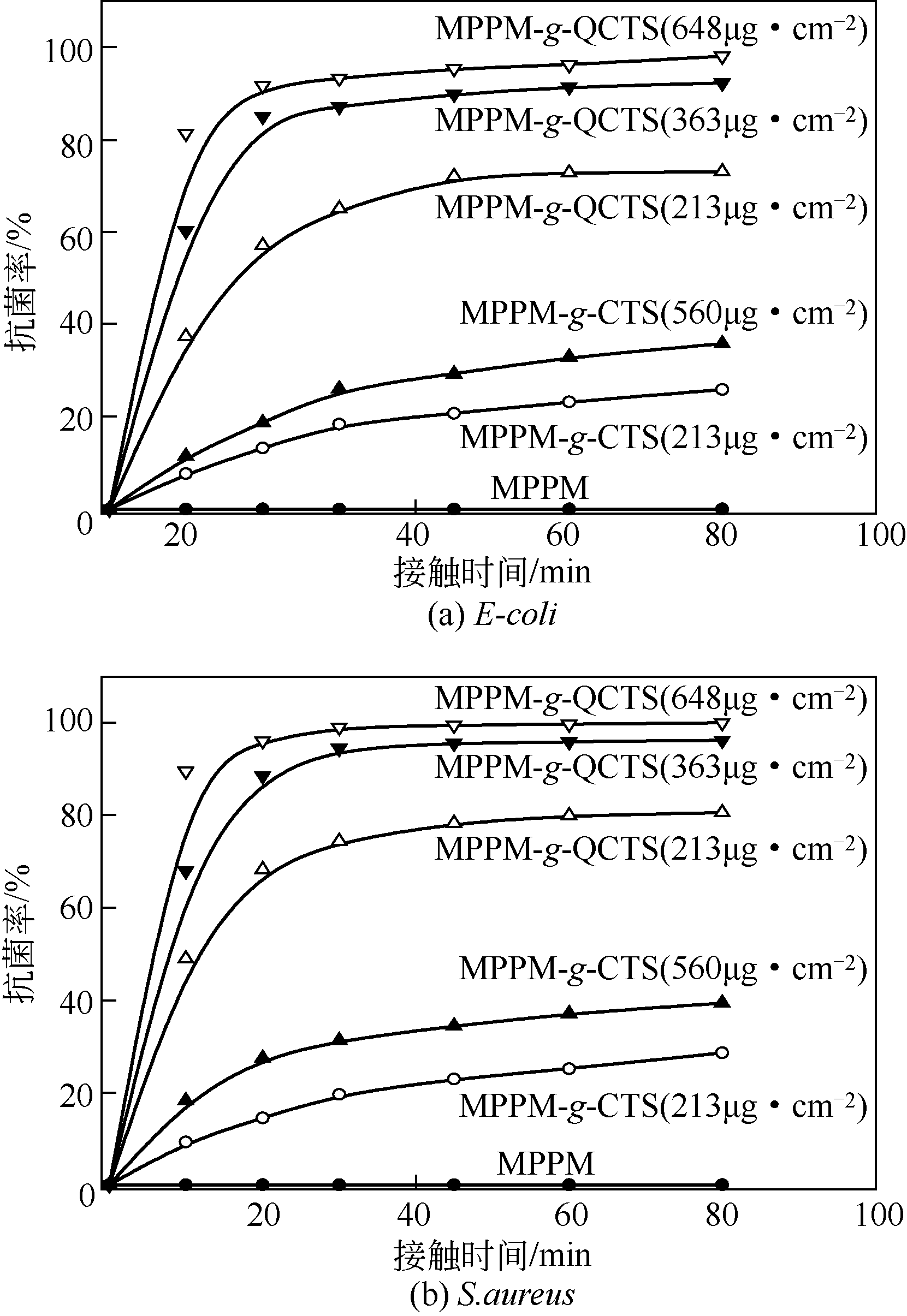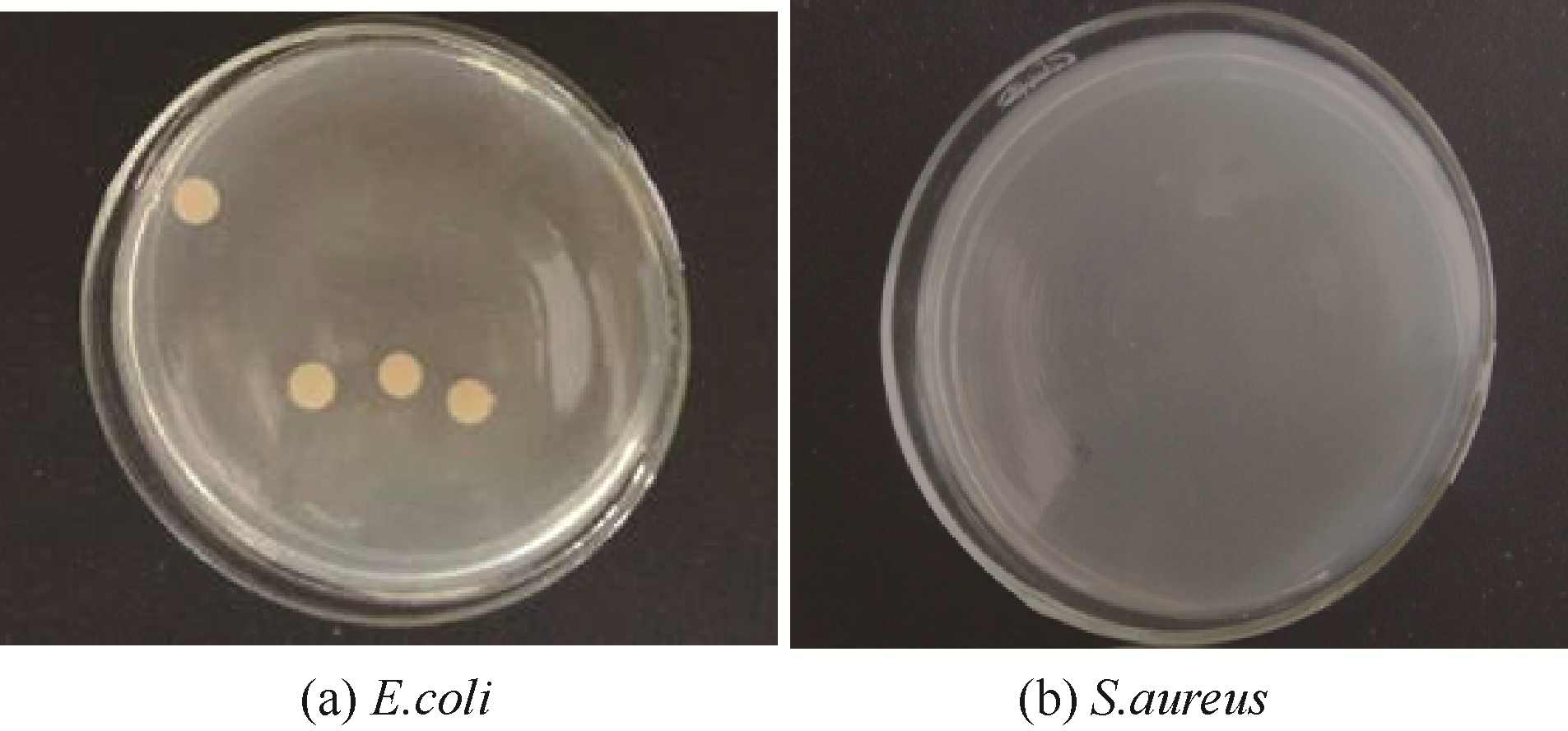Chemical Industry and Engineering Progress ›› 2021, Vol. 40 ›› Issue (1): 332-338.DOI: 10.16085/j.issn.1000-6613.2020-0518
• Materials science and technology • Previous Articles Next Articles
Covalent modification of chitosan quaternary ammonium salt on microporous polypropylene membrane and its antibacterial properties
- Key Laboratory of Green Chemical Technology of Fujian Provincial Institution of Higher Learning, School of Ecology and Resource Engineering, Wuyi University, Wuyishan 354300, Fujian, China
-
Received:2020-04-03Online:2021-01-12Published:2021-01-05 -
Contact:Ximing ZHENG
微孔聚丙烯膜表面壳聚糖季铵盐的共价修饰及其抗菌性能
- 绿色化工技术福建省高等学校重点实验室,武夷学院生态与资源工程学院,福建 武夷山 354300
-
通讯作者:郑细鸣 -
作者简介:郑细鸣(1970—),男,博士,教授,研究方向为膜分离技术。E-mail:zhengxm70@163.com 。 -
基金资助:福建省自然科学基金(2018J01446)
CLC Number:
Cite this article
Ximing ZHENG, Rongyu FAN. Covalent modification of chitosan quaternary ammonium salt on microporous polypropylene membrane and its antibacterial properties[J]. Chemical Industry and Engineering Progress, 2021, 40(1): 332-338.
郑细鸣, 范荣玉. 微孔聚丙烯膜表面壳聚糖季铵盐的共价修饰及其抗菌性能[J]. 化工进展, 2021, 40(1): 332-338.
share this article
Add to citation manager EndNote|Ris|BibTeX
URL: https://hgjz.cip.com.cn/EN/10.16085/j.issn.1000-6613.2020-0518
| 1 | WEN L P, TIAN Y, JIANG L. Bioinspired super-wettability from fundamental research to practical applications [J]. Angewandte Chemie: International Edition, 2015, 54(11): 3387-3399. |
| 2 | OCHOA N A, MASUELLII M, MARCHESE J. Effect of hydrophilicity on fouling of an emulsified oil wastewater with PVDF/PMMA membranes[J]. Journal of Membrane Science, 2003, 226: 203-211. |
| 3 | HAWKINGS M L, FAY F, REHEL K, et al. Bacteria and diatom resistance of silicones modified with PEO-silane amphiphiles[J]. Biofouling, 2014, 30(2): 247-258. |
| 4 | MA M Q, ZHANG C, CHEN T T, et al. Bioinspired polydopamine/polyzwitterion coatings for underwater anti-oil and -freezing surfaces [J]. Langmuirm, 2019, 35: 1895-1901. |
| 5 | HUANG Y F, LIU Z. The modification of polypropylene hollow fiber membrane by grafting with N,N'-methylene-bisac-rylamide on the surface[J]. Advanced Materials Research, 2013, 699: 783-788. |
| 6 | MIAO C L, WANG H. Research in surface modification and anti-fouling of polypropylene porous membrane[J]. Advanced Materials Research, 2013, 634: 353-356. |
| 7 | ZHAO J, SONG L, SHI Q, et al. Antibacterial and hemocompatibility switchable polypropylene nonwoven fabric membrane surface[J]. ACS Applied Materials & Interfaces, 2013, 5(11): 5260-5268. |
| 8 | HOU S H, ZHENG J F, ZHANG S B, et al. Novel amphiphilic PEO-grafted cardo poly(aryl ether sulfone) copolymer: synthesis, characterization and antifouling performance [J]. Polymer, 2015, 77: 48-54. |
| 9 | YANG Y F, WAN L S, XU Z K. Surface hydrophilization ofmicroporous polypropylene membrane by the interfacial crosslinking of polyethylenimine[J]. Journal of Membrane Science, 2009, 337: 70-80. |
| 10 | 代俊明, 孙秀花, 高昌录. 共混改性法对有机分离膜影响进展[J]. 化工进展, 2019, 38(S1): 159-165. |
| DAI Junming, SUN Xiuhua, GAO Changlu. Advances on effects of blending modification on organic separation membranes[J]. Chemical Industry and Engineering Progress, 2019, 38(S1): 159-165. | |
| 11 | SAFFAR A, CARREAU P J, AJJI A, et al. Development of polypropylene microporous hydrophilic membranes by blending with PP-g-MA and PP-g-AA[J]. Journal of Membrane Science, 2014, 462: 50-61. |
| 12 | ZHAO Y F, ZHU L P, JIANG J H, et al. Enhancing the antifouling and antimicrobial properties of poly (ether sulfone) membranes by surface quaternization from a reactive poly(ether sulfone) based copolymer additive[J]. Angewandte Chemie: International Edition, 2014, 53(36): 13952-13962. |
| 13 | 范荣玉, 郑细鸣, 李彬彬. 聚丙烯微孔膜的表面矿化修饰及其亲水性能[J]. 化工学报, 2015, 66(2): 626-634. |
| FAN Rongyu, ZHENG Ximing, LI Binbin. Surface mineralized modification of microporous polypropylene membrane and its hydrophilic properties[J]. CIESC Journal, 2015, 66(2): 626-634. | |
| 14 | CHEN P C, WAN L S, XU Z K. Bio-inspired CaCO3 coating for superhydrophilic hybrid membranes with highwater permeability[J]. Journal of Materials Chemistry, 2012, 22: 22727-22733. |
| 15 | LIU Z Y, HU Y X. Sustainable antibiofouling properties of thin film composite forward osmosis membrane with rechargeable silver nanoparticles loading[J]. ACS Applied Materials & Interfaces, 2016, 8: 21666-21673. |
| 16 | PI J K, YANG H C, WAN L S, et al. Polypropylene microfiltration membranes modified with TiO2 nanoparticles for surface wettability and antifouling property[J]. Journal of Membrane Science, 2016, 500: 8-15. |
| 17 | VOO Z X, KHAN M, NARAYANAN K, et al. Antimicrobial/antifouling polycarbonate coatings: role of block copolymer architecture[J]. Macromolecules, 2015, 48: 1055-1064. |
| 18 | LIN J, QIU S Y, LEWIS K, et al. Mechanism of bactericidal and fungicidal activities of textiles covalently modified with alkylated polyethylenimine[J]. Biotechnol. Bioeng., 2003, 83(2): 168-172. |
| 19 | DEMIR B, CERKEZ I, WORLEY S D, et al. N-halamine-modified antimicrobial polypropylene nonwoven fabrics for use against airborne bacteria[J]. ACS Applied Materials & Interfaces, 2015, 7: 1752-1757. |
| 20 | LI R, HU P, REN X, et al. Antimicrobial N-halamine modified chitosan films[J]. Carbohydrate Polymers, 2013, 92(1): 534-539. |
| 21 | ANDRESEN M, STENATAD P, MORETRO T, et al. Nonleaching antimicrobial films prepared from surface-modified microfibrillated cellulose[J]. Biomacromolecules, 2007, 8: 2149-2155. |
| 22 | AUMSUWAN N, HEINHORST S, URBAN M W. The effectiveness of antibiotic activity of penicillin attached to expanded poly(tetrafluoroethylene) (ePTFE) surfaces: a quantitative assessment[J]. Biomacromolecules, 2007, 8: 3525-3530. |
| 23 | KENAWY E R, WORLEY S D, BROUGHTON R. The chemistry and applications of antimicrobial polymers: a state-of-the-art review[J]. Biomacromolecules, 2007, 8: 1359-1384. |
| 24 | MONTEFUSCO-PEREIRA C V, FORMICOLA B, GOES A, et al. Coupling quaternary ammonium surfactants to the surface of liposomes improves both antibacterial efficacy and host cell biocompatibility[J]. European Journal of Pharmaceutics and Biopharmaceutics, 2020, 149: 12-20. |
| 25 | KANAZAWA A, IKEDA T, ENDO T. Polymeric phosphonium salts as a novel class of cationic biocides. Ⅲ. Immobilization of phosphonium salts by surface photografting and antibacterial activity of the surface-treated polymer films[J]. Journal of Polymer Science Part A: Polymer Chemistry, 1993, 31(6): 1467-1472. |
| 26 | MARIA C R A, DIAS D M C L. Cationic antimicrobial polymers and their assemblies[J]. International Journal of Molecular Sciences, 2013, 14(5): 9906-9946. |
| 27 | PRASHANTH K V H, THARANATHAN R N. Chitin/chitosan: modifications and their unlimited application potential—An overview [J]. Trends in Food Science & Technology, 2007, 18(3): 117-131. |
| 28 | LI X, SUN J, CHE Y, et al. Antibacterial properties of chitosan chloride-graphene oxide composites modified quartz sand filter media in water treatment[J]. International Journal of Biological Macromolecules, 2019, 121: 760-773. |
| 29 | 郑云龙, 王进美, 孙正琪, 等. 壳聚糖/明胶抗菌微胶囊的制备及其应用[J]. 化工进展, 2020, 39(3): 1137-1144. |
| ZHENG Yunlong, WANG Jinmei, SUN Zhengqi, et al. Preparation and application of chitosan/gelatin antibacterial microcapsule[J]. Chemical Industry and Engineering Progress, 2020, 39(3): 1137-1144. | |
| 30 | WANG C H, LIU W S, SUN J F, et al. Non-toxic O-quaternized chitosan materials with better water solubility and antimicrobial function[J]. International Journal of Biological Macromolecules, 2016, 84: 418-427. |
| 31 | TANG R, ZHANG Y, ZHANG Y, et al. Synthesis and characterization of chitosan based dye containing quaternary ammonium group[J]. Carbohydr Polym., 2016, 139: 191-196. |
| 32 | 陈燕燕, 李明春, 辛梅华, 等. 海因改性N-季铵化壳聚糖衍生物的合成及其抗菌性能[J]. 化工进展, 2015, 34(1): 188-192, 233. |
| CHEN Yanyan, LI Mingchun, XIN Meihua, et al. Synthesis and antibacterial research of hydantoin modified quaternary ammonium chitosan[J]. Chemical Industry and Engineering Progree, 2015, 34(1): 188-192, 233. | |
| 33 | LI J, XIE B, XIA K, et al. Facile synthesis and characterization of cross-linked chitosan quaternary ammonium salt membrane for antibacterial coating of piezoelectric sensors[J]. International Journal of Biological Macromolecules, 2018, 120: 745-752. |
| 34 | 郑细鸣, 范荣玉, 徐志康. 铅(Ⅱ)离子印迹复合膜的制备及其性能研究[J]. 高分子学报, 2012, 5: 561-569. |
| ZHENG Ximing, FAN Rongyu, XU Zhikang. Preparation and property evaluationof Pb(Ⅱ) ion-imprinted composite wembranes[J]. Acta Polymerica Sinica, 2012, 5: 561-569. |
| [1] | HE Meijin. Application and development trend of molecular management in separation technology in petrochemical field [J]. Chemical Industry and Engineering Progress, 2023, 42(S1): 260-266. |
| [2] | ZHANG Zuoqun, GAO Yang, BAI Chaojie, XUE Lixin. Thin-film nanocomposite (TFN) mixed matrix reverse osmosis (MMRO) membranes from secondary interface polymerization containing in situ grown ZIF-8 nano-particles [J]. Chemical Industry and Engineering Progress, 2023, 42(S1): 364-373. |
| [3] | CUI Shoucheng, XU Hongbo, PENG Nan. Simulation analysis of two MOFs materials for O2/He adsorption separation [J]. Chemical Industry and Engineering Progress, 2023, 42(S1): 382-390. |
| [4] | LI Shilin, HU Jingze, WANG Yilin, WANG Qingji, SHAO Lei. Research progress in separation and extraction of high value components by electrodialysis [J]. Chemical Industry and Engineering Progress, 2023, 42(S1): 420-429. |
| [5] | GUO Qiang, ZHAO Wenkai, XIAO Yonghou. Numerical simulation of enhancing fluid perturbation to improve separation of dimethyl sulfide/nitrogen via pressure swing adsorption [J]. Chemical Industry and Engineering Progress, 2023, 42(S1): 64-72. |
| [6] | LIAO Zhixin, LUO Tao, WANG Hong, KONG Jiajun, SHEN Haiping, GUAN Cuishi, WANG Cuihong, SHE Yucheng. Application and progress of solvent deasphalting technology [J]. Chemical Industry and Engineering Progress, 2023, 42(9): 4573-4586. |
| [7] | WANG Shaofan, ZHOU Ying, HAO Kang’an, HUANG Anrong, ZHANG Ruju, WU Chong, ZUO Xiaoling. Self-healing and blue-light hydrogel with pH responsiveness [J]. Chemical Industry and Engineering Progress, 2023, 42(9): 4837-4846. |
| [8] | LI Xuejia, LI Peng, LI Zhixia, JIN Dunshang, GUO Qiang, SONG Xufeng, SONG Peng, PENG Yuelian. Experimental comparation on anti-scaling and anti-wetting ability of hydrophilic and hydrophobic modified membranes [J]. Chemical Industry and Engineering Progress, 2023, 42(8): 4458-4464. |
| [9] | PAN Yichang, ZHOU Rongfei, XING Weihong. Advanced microporous membranes for efficient separation of same-carbon-number hydrocarbon mixtures: State-of-the-art and challenges [J]. Chemical Industry and Engineering Progress, 2023, 42(8): 3926-3942. |
| [10] | ZHOU Longda, ZHAO Lixin, XU Baorui, ZHANG Shuang, LIU Lin. Advances in electrostatic-cyclonic coupling enhanced multiphase media separation research [J]. Chemical Industry and Engineering Progress, 2023, 42(7): 3443-3456. |
| [11] | CHEN Xiangli, LI Qianqian, ZHANG Tian, LI Biao, LI Kangkang. Research progress on self-healing oil/water separation membranes [J]. Chemical Industry and Engineering Progress, 2023, 42(7): 3600-3610. |
| [12] | LOU Baohui, WU Xianhao, ZHANG Chi, CHEN Zhen, FENG Xiangdong. Advances in nanofluid for CO2 absorption and separation [J]. Chemical Industry and Engineering Progress, 2023, 42(7): 3802-3815. |
| [13] | ZHOU Lei, SUN Xiaoyan, TAO Shaohui, CHEN Yushi, XIANG Shuguang. Development and application of refinery short-cut column model [J]. Chemical Industry and Engineering Progress, 2023, 42(6): 2819-2827. |
| [14] | WU Heping, CAO Ning, XU Yuanyuan, CAO Yunbo, LI Yudong, YANG Qiang, LU Hao. Rapid separation of hydrofluoric acid and alkylated oil [J]. Chemical Industry and Engineering Progress, 2023, 42(6): 2845-2853. |
| [15] | SONG Minhang, ZHAO Lixin, XU Baorui, LIU Lin, ZHANG Shuang. Research progress of cyclone-enhanced separation based on disperse phase rearrangement at the inlet [J]. Chemical Industry and Engineering Progress, 2023, 42(5): 2219-2232. |
| Viewed | ||||||
|
Full text |
|
|||||
|
Abstract |
|
|||||

